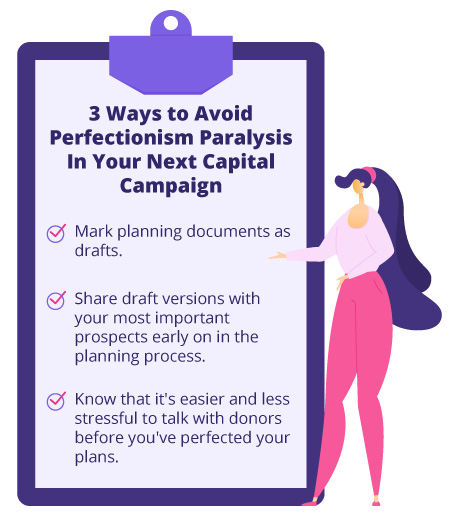How to Avoid Perfectionism Paralysis in Capital Campaigns
If your capital campaign is going to be successful, you will need generous contributions from your very top projects.
In fact, according to recent research by Capital Campaign Pro, most campaigns raise more than half their goal (71%, on average!) from fewer than 20 donors. So how you approach those 20 donors matters a great deal.
And if you’re like many people, you may fall into the “We had better be perfect” trap. It’s a natural mistake. Because those top donors are so important, and you worry that you might not get more than one opportunity to ask them for a big gift, it’s got to be right!
As a result, you may be tempted to put off those big donor visits until all of your plans and your materials are buttoned down and look super professional.
In fact, you might feel paralyzed by your commitment to perfection and put off those big donor visits far longer than you should.
Here’s the truth, though. The drive to be perfect before you talk to your big donors, while understandable, is actually the wrong approach. Not only will it delay your campaign, it’s likely to diminish the chances of your success.
Why?
Because the essence of getting those large gifts isn’t buttoning down every detail. The essence is quite the opposite. Your task isn’t to make a perfect presentation, it’s to involve those large donors early and often in the planning of your project long before you make your pitch and ask for a gift.
Here are three things you can do to make sure you don’t fall into the perfectionism trap with your next capital campaign.

1. Mark planning documents as drafts.
Alternatively, get in the habit of using the phrase “preliminary plan.” Make sure to date each version of every draft. You will likely go through several drafts that will shift, change, and improve with each version. Without dating the versions and renaming and dating subsequent documents like your case for support or gift range chart, you won’t be able to keep track of which is an earlier version and which one is current.
2. Share draft versions with your most important prospects early on in the planning process.
Don’t wait until your plans are finalized. Think about it this way: If you don’t approach that local politician or business owner until everything is buttoned down and perfect, then all you have to talk to them about is money.
But if you share your plans while they are still in the formative stage, you can have far more probing and exploratory conversations with them. Those conversations will help you benefit from their ideas and give you insights into their interests and philanthropic motivations.
3. Know that it’s easier and less stressful to talk with donors before you’ve perfected your plans.
The more time and energy you’ve put into making everything perfect, the more likely you’ll find yourself selling and then defending your plans rather than discussing them.
It turns out that not only does trying to be perfect often slow you down, but it’s actually a less powerful approach to engaging your donors. And it is well-documented that engaged donors give more and give more generously.
So, don’t fall into the perfectionism trap. Train yourself to share your plans before they are fully formed and enjoy the benefits of getting wisdom and advice from the people who can help you most.



